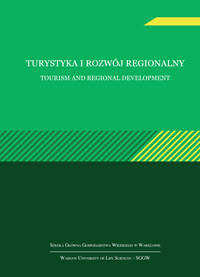Main Article Content
Article Details
Adler P.S., Kwon S.-W. (2002). Social Capital: Prospects for a New Concept. Academy of Management Review, 27 (1), pp. 17-40. DOI: https://doi.org/10.2307/4134367 (Crossref)
Banaszak, I. (2008). Agricultural Producer Groups in Poland: Empirical Survey Results. Journal of Rural Cooperation, 36 (1), pp. 73-86. DOI: https://doi.org/10.22004/ag.econ.163449
Banaszak, I., Beckmann, V. (2010). Compliance with Rules and Sanctions in Producer Groups in Poland. Journal of Rural Cooperation, 38 (1), pp. 55-70. DOI: https://doi.org/10.22004/ ag.econ.163872
Bourdieu, P. (1986). The forms of capital. In: Richardson, J.G. (ed.). Handbook of Theory of Research for the Sociology of Education. New York: Greenwood Press.
Burt, R.S. (2005). Brokerage and Closure. An introduction to Social Capital. Oxford: Oxford University Press.
Chlebicka, A., Fatkowski, J., Lopaciuk-Gonczaryk, B. (2017). Horizontal integration between farmers governing cooperation through different enforcement mechanism. In: Martino, G., Karantini- nis, K., Pascucci, S., Dries, L., Codron, J.M. (ed). Its a jungle out there - the strange animals of economic organization in agri-food value chains. Wageningen: Wageningen Academic Publis¬hers, pp. 85-104. (Crossref)
Chlebicka, A., Pietrzak, M. (2018). Size of Membership and Survival Patterns of Producers' Organizati¬ons in Agriculture-Social Aspects Based on Evidence from Poland. Sustainability, 10 (7), 2293. DOI: https://doi.org/10.3390/sul0072293 (Crossref)
Fatkowski, J., Ciaian, P. (2016). Factors Supporting the Development of Producer Organizations and their Impacts in the Light of Ongoing Changes in Food Supply Chains: A Literature Review. Joint Research Centre European Commission Technical Report No. EUR 27929 EN, pp. 1-57. DOI: https://doi.org/10.2791/21346
Fałkowski, J., Chlebicka, A., Łopaciuk-Gonczaryk, B. (2017). Social relationships and governing collabo¬rative actions in rural areas: Some evidence from agricultural producer groups in Poland. Jour¬nal of Rural Studies, 49, pp. 104-116. DOI: https://doi.org/10.1016/jjrurstud.2016.ll.010 (Crossref)
Fukuyama, F. (2000). Social Capital and Civil Society. International Monetary Fund Working Pa¬per. Available online: https://www.imf.org/external/pubs/ft/wp/2000/wp0074.pdf (access: 10.05.2022).
Fulton, M. (1999). Cooperatives and member commitment. The Finnish Journal of Business Econo¬mics, 4, pp. 418-437.
Fulton, M., Adamowicz, W.L. (1993). Factors that influence the commitment of members to their co¬operative organization. Journal of Agricultural Cooperation, 8, pp. 39-53.
Gargiulo, M., Benassi, M. (2000). Trapped in Your Own Net? Network Cohesion, Structural Holes and the Adaptation of Social Capital. Organization Science, 11, pp. 183-196. DOI: https://doi. org/10.1287/orsc.11.2.183.12514 (Crossref)
Granovetter, M. (1985). Economic Action and Social Structure: The Problem of Embeddedness. The American Journal of Sociology, 91 (3), pp. 481-510. (Crossref)
Hendrikse, G., Bijman, J. (2002). Ownership Structure in Agrifood Chains: The Marketing Coope¬rative. American Journal of Agricultural Economics, 84, pp. 104-119. DOI: https://doi. org/10.1111/1467-8276.00246 (Crossref)
Krzyżanowska, K., Parzonko, A., Sieczko, A. (2020). Przedsiębiorczość zespołowa na obszarach wiejs¬kich. Stan i perspektywy rozwoju. Warszawa: Wydawnictwo SGGW.
Pietrzak, M. (2019). Fenomen spółdzielni rolników - pomiędzy rynkiem, hierarchią i klanem. Warsza¬wa: Wydawnictwo CeDeWu.
Tsai, W., Ghoshal, S. (1998). Social capital and value creation: The role of intrafirm networks. Academy of Management Review, 41 (4), pp. 464-476. DOI: https://doi.org/10.2307/257085 (Crossref)
Valentinov, V. (2004). Toward a Social Capital Theory of Co-operative Organisation. Journal of Coopera¬tive Studies, 37, pp. 5-20.
Wathne, K.H., Heide, J.B. (2000). Opportunism in Interfirm Relationships: Forms, Outcomes, and Solu¬tions. Journal of Marketing, 64 (4), pp. 36-51. DOI: https://doi.Org/10.1509/jmkg.64.4.36.180 (Crossref)
Williamson, O.E. (1985). The Economic Institutions of Capitalism. New York: The Free Press.
Downloads
- Joanna Domagała, Michał Pietrzak, Regionalne zróżnicowanie efektywności szkolnictwa wyższego w Polsce , Turystyka i Rozwój Regionalny: Nr 20 (2023)
- Aleksandra Chlebicka, Michał Pietrzak, Member selection criteria in fruit and vegetable producer organizations in Poland , Turystyka i Rozwój Regionalny: Nr 19 (2023)

Utwór dostępny jest na licencji Creative Commons Uznanie autorstwa – Użycie niekomercyjne 4.0 Międzynarodowe.





